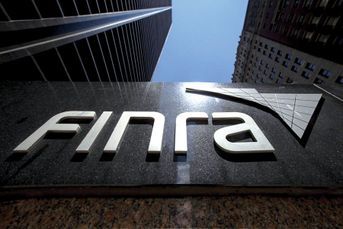Securities America, Ameriprise private-placement cases could drag on
The proposed class action settlements reached by Securities America Inc. and its parent Ameriprise Financial Inc. with clients who bought allegedly fraudulent private placements from Securities America between 2003 and 2009 could be upended by investors who opt out of the deal
The proposed class action settlements reached by Securities America Inc. and its parent Ameriprise Financial Inc. with clients who bought allegedly fraudulent private placements from Securities America between 2003 and 2009 could be upended by investors who opt out of the deal.
As part of the proposed settlement, a federal judge in Dallas, W. Royal Furgeson Jr., has frozen three arbitration claims by individual investors who sued Securities America through arbitration under the Financial Industry Regulatory Authority Inc.
The judge last month issued a temporary restraining order regarding the arbitrations as part of Securities America’s potential offer of $21 million to investors suing the firm over private placements issued by Medical Capital Holdings Inc. and Provident Royalties LLC. The SEC in 2009 charged both those sponsors with fraud.
LIMITED FUNDS
Mr. Furgeson wrote that his decision, in large part, was due to the limited funds Securities America has on hand to pay investors.
“If the arbitration were to proceed, it would expend funds for legal defense that would otherwise be made available to class members,” he wrote.
Attorneys noted that investors’ legal path to “opt out” — declining to join a class and suing individually — is a well-established legal precept.
“There is very strong law favoring the right of the individual to opt out of a class,” said William Kelly, a partner at Nixon Peabody LLP. “It’s always been the case that plaintiffs can pursue separate claims, distinguished from the class action lawsuit.”
One securities regulator and plaintiff’s attorney took issue with the judge’s authority to freeze investors’ arbitration claims in the dispute.
“I don’t think Judge Furgeson has the power to do this,” said Joseph Long, director of securities regulation for New Hampshire. “But on the other hand, [he] thinks he does.”
Mr. Long said that he isn’t involved in the dispute, Billitteri v. Securities America Inc., et al., but has been looking at the case.
In a phone call last Thursday, Mr. Furgeson declined to comment on the case, adding: “Nothing is settled yet. I’m still hearing the issues.”
The scope of the proposed settlement widened last week, with the plaintiffs’ lead attorney, Daniel Girard, saying that Ameriprise, which owns Securities America, will create a separate settlement pot of $27 million for investors who bought private placements.
“We are pleased to have reached an agreement to settle claims brought against Ameriprise as corporate parent related to certain private placements sold by our subsidiary Securities America,” Ameriprise spokesman Chris Reese wrote in an e-mail.
The suit alleges that Securities America handed clients a private-placement memorandum that contained untrue statements about the deals and omitted other material information.
A spokeswoman for Securities America, Janine Wertheim, declined to comment about the future of the potential settlement.
The proposed settlement also throws into question the status of complaints by securities regulators for Massachusetts and Montana, both of which sued Securities America last year. Those lawsuits seek restitution to investors in those states, as well as potential fines.
Brian McNiff, a spokesman for the Massachusetts Securities Division, said the two states intend to file a brief regarding the matter.
Mr. Furgeson will hold a hearing on the proposed settlements in federal court in Dallas on March 18. Lawyers for the plaintiffs pursuing arbitration plan to argue vigorously against any settlement that would freeze their claims against Securities America.
According to Ameriprise, Securities America investors have lost about $400 million from those two deals.
With Securities America looking to squeeze another $4 million from its insurance carrier, the money for investors would be about $52 million, Mr. Girard said. That works out to about 15 cents on the dollar for investors.
“The proposed class action settlement is substantially greater that the net worth” of Securities America, he said, pointing to the fact that a substantial portion, $11 million, of Securities America’s settlement is to come from the firm’s future earnings.
Ameriprise’s liability stems from the fact that it was a “control person” with respect to Securities America, Mr. Girard said.
The Ameriprise and Securities America settlements were independent of each other, he said.
The potential settlement has eaten into Securities America’s capital foundation, an essential part of a broker-dealer’s remaining in compliance with SEC rules and regulations. Its capital on hand has plummeted 86% in the past year, according to Amerprise’s annual report.
The 10-K filing indicated that Securities America had $2 million in “actual capital” on hand at the end of 2010. A year earlier, the firm had $15 million, according to the report.
And according to other SEC filings, Securities America had net capital of $17.4 million in 2008 and has a minimum net capital level of about $250,000.
A spokeswoman for Securities America, Janine Wertheim, said that the reported drop in capital levels was related directly to a host of legal disputes stemming from clients who bought Regulation D offerings by Medical Capital and Provident.
The drop in Securities America’s capital level occurred because the firm “has set aside additional capital for the potential resolution” of the lawsuits, she said.
Ms. Wertheim declined to comment further about the firm’s capital levels and didn’t respond to questions about whether the firm would have difficulty winning the argument that all clients should be part of the class action.
According to federal court documents detailing the agreement, the brokerage contributed $7 million of its excess net capital toward the $21 million settlement, with the rest coming from reserves ($2.3 million), future earnings ($11 million), and available cash ($800,000).
NO ‘IMMINENT JEOPARDY’
Finra has eyeballed the potential settlement, according to the documents. It has determined that the $7 million payment from excess net capital “will not place the company in imminent jeopardy of a net capital deficiency,” according to the settlement document.
Nancy Condon, a spokeswoman for Finra, declined to comment.
E-mail Bruce Kelly at [email protected].
Learn more about reprints and licensing for this article.








